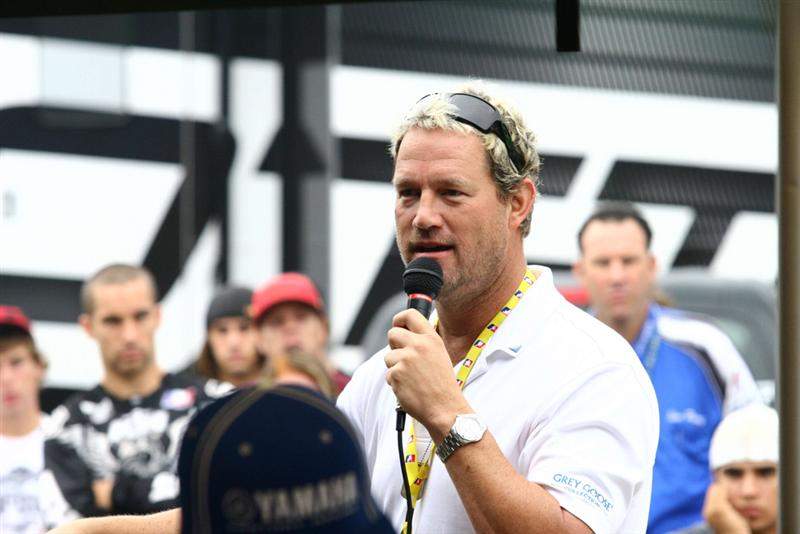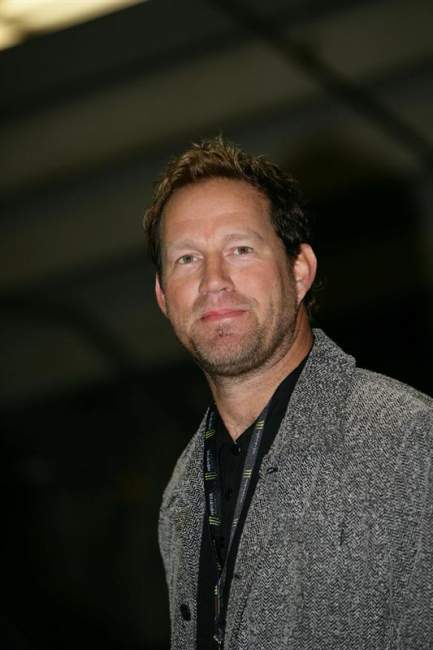Steve Hudson is a modern staple in the motocross world. He is at the races week-in, week-out preaching to and helping the riders and other industry people who are also at the races week-in and week-out. Since most people at the races can’t go to church, Chappy (as he’s known) holds a chapel service at every race after the riders’ meeting, and helps out in many ways as well, whenever he’s needed. To learn more about Hudson, go to his website, www.chappymx.com. He’s this week’s “Between the Motos.”
Steve Hudson: I’ve been doing this for 14 years, and they used to have practice day, and I’d get in on Friday, and sometimes Thursday evening, and I’d go out to dinner with anybody in the community that wanted to and gave me a call to say, “Hey, I wanted to talk to you.” So I’d go out to dinner with them that night, and then Saturday morning, on race day, after the riders’ meeting... All of these guys and girls that are on the road every weekend, they don’t get a chance to go to church anywhere, and I guess it was a few years ago that a guy named Roland Hinz helped me out and helped me get my feet on the ground, and I tell you, Steve, I went out there and looked at those guys in Orlando my first year, and I thought, “These guys don’t want nothing to do with this, but I’ll just come each week and do what we call a chapel service after the riders’ meeting.” So, when it was over, Duke Finch introduced me, and Steve Wise took me around and introduced me, and so after every riders’ meeting [from there on out] I would say, “We’re going to do a chapel service if you want to stick around,” and people would be like, “What?”
Then, it just started growing, and I not only do chapel services, but I go to the hospital when people get hurt, and when they’re hurt on the track, I try to see what’s happening and be there when they’re on the track, and the first couple of years, every time somebody went down I was there, whereas now I kind of step back and wait and watch Doc Bodnar or Dr. Augustine or Eddie or any of those guys to see what the level of trauma is that’s going on. But I like to be there when they get hurt. I’m not there every time, because people are getting hurt in practices and so on and so forth. But I also do weddings, because many of these guys don’t have a relationship with a pastor back home, since they’re at the races, and I’m able to develop a relationship and do marital counseling on the road for these guys. I do their weddings, and I’ve done a good portion of the riders’ weddings that are married now. I also do some things for the couples after they’ve been married (laughs). I do that. It’s just kind of a real neat thing. I’m basically a pastor that gets to hang out with people two or three days every weekend, and that’s what I do.
I hate to say it, but I also do funerals, and I’ve done them for family members of riders and things like that, and that’s always difficult, and it looks like with the passing of Jeremy [Lusk] that I’ll be involved in doing something there. It’s an honor and a privilege to do it, and it’s a difficult task, but I really, thoroughly enjoy it.
Were you involved in motocross previously? Or was it just the religion thing that sort of led you here?
The closest thing I knew to supercross or motocross was about two and a half or three miles from my house, and there were these little boys riding in their front yard, and I said, “That mom and dad, they’re wacked to let their kid ride around in the front yard like that,” and it turned out to be Damon Bradshaw (laughs). I’ve since told both his mom and dad, and his mom and dad knew my sister, and that was kind of crazy, but I didn’t know anything about motocross. I just wanted to take people that were in my church out to the racetrack in Charlotte and do ministry, and when I did, the guys out there were like, “This is a great idea.” When I did it, there was already a ministry for the drivers, and I wanted to minister for all of the nuts that were on the infield partying like mad dogs on Saturday night. So, a little bit later, that ministry came to me and said, “We want you to come work for us,” and I was like, “No, I’m good. I’m happy here at the church.” About a year later, they said, “Would you take a look at this motocross and supercross thing?” That was 1995, and I went to the AMA and started getting to know people, and that’s when it all started.
You know what’s cool? The thing that I saw is that all of these people basically come from the same sort of demographic – they started riding at an early age, and they tended to race a lot on Sundays, and it’s a family-oriented sport. But I really felt like those were some great components to do ministry, because it’s around the family. The biggest difference I saw was I saw families that just lived regular lives coming to church, but these people in racing, it’s like they have two lives – they have the weekday life, with mom and dad doing their jobs, and then they have their weekend lives where it was just all family, all together, all weekend. And I thought those were good components.
I’ll be honest with you, Steve, I have seen in my years out here, there needs to be a manual written for parents to say that you should always be a parent and then a friend second. That’s been a unique situation to watch the relationship between child and parent, and then professional and parent, and honestly, I’m a parent, and I’m not telling parents how to parent, but I’m just saying what I’ve found that works, and being a parent is the most difficult job. It just seems like a lot of these parents try to be more than a parent, and there’s a lot hidden in that sentence, and I’ll just leave it at that. I think once you do the job of a parent, yeah, you’re going to be a parent forever, but some people try to be too much, or just hang on too long, or be a friend... I could go on and on about that, but I don’t think that’s a direction we want to go. But the core that I thought would be nice is family, and that’s been a place where I’ve been able to do a lot of ministry: Helping the moms and dads, seeing their kids grow up, and giving them space, and helping them through girlfriends and money and trying to get them to understand, “You raised them. They’re going to make some bonehead moves, but you’re the one that raised them,” and that’s been interesting and fun.
I guess, to answer your question, people are people no matter where you are. I don’t even own a motorcycle. It’s not that I don’t care or don’t like it, but my passion is golf, and I’m not really way into the racing, I just really love the people in the motocross and supercross community. They’re a driven group of people, and they’re passionate, and funny, but they’re just people, so I felt like that’s where God was wanting me to go, where people were not going to church, and just see if I can carve something out. I’d say it’s going pretty well right now.
How do you handle the special set of issues that comes along with young guys becoming successful, making money, handling media and fans, etc.? That has to create some interesting moral, or maybe religious, dilemmas, doesn’t it?
I have dealt with that, but like anything, Steve, until people experience the emptiness of what these things bring... Money can cause some good things to happen, and alleviate some pressure here and there, but I’ll be honest with you, Steve, I talk to people whose retirements are set up, but their retirements are set up to start when they’re 50, and they’re still riding. What are you going to do from 28 or 34 until retirement? I know our guys retire at, I would speculate, an average age of 29.5, and there are a few that go longer, and a few that go shorter, but it’s what to do between that and the real retirement age that’s the issue. There’s a handful of guys that make a boatload of money who will never have to worry about it, and there are also a couple of handfuls of guys that have made very good money but live at a certain standard, and keeping that standard going, I think, can cause issues and problems after racing. That, in itself, I deal with a lot. I’m trying to tell a lot of these young guys, “I know you don’t like getting an agent, but get an agent that’s going to set you up. You might be making $800,000 a year right now, but in eight years, you’re going to be making $40,000 or $60,000, so just make sure he’s got you some money coming in every year.” And with today’s economy, it’s a wacked situation, but those are the things that I deal with. It’s an absolute continual and repetitive story, year after year.
It’s funny because one probably wouldn’t assume that the church guy is helping people with all of these other things that aren’t necessarily religious in nature, you know?
Truly, I think that’s where people get the wrong idea about church, about ministers, or about priests. They think our whole thing is designed to turn people into nice robots. But that’s not it. My deal is that I believe God created these people to ride motorcycles and enjoy what he’s given them. He’s given them a talent. And along with that talent comes temptation and lots of choices, and as soon as you learn how to make the choices in a right manner, the more mature you get, and the better things turn out, then I personally feel like the book that I read, the Bible, is every answer to every question that you’re ever going to need, from humility, to how to act, to girlfriends, or even to how to win a race. There’s a little scripture that says, “Run the race in order to get the prize.” Basically, the translation there is that you need to realize that this is a long race, and you need to make yourself the type of racer that can finish the race. The Bible talks about racing, you know? It wasn’t car racing, it was foot racing...
Really? They didn’t have NASCAR 2000 years ago?
(Laughs) But it talks about the racer, and I’m just dealing with people that happen to race, and I believe got made people, and I love his manual.
No, but you know, I talk to you every weekend, and like I said, it’s an honor to be doing this. I miss a lot of life with my two boys, but I’m also privileged to be able to take them to a few places. That’s always the difficulty, when I’m missing ballgames and certain times in their life. How long can I do this? I want to do it as long as I’m effective. When I’m not effective, I want to move on. I feel like the god that put me here is the god that will move me out. When my passion and desire to see these people make some changes in their lives dies out...
I’ll tell you, Steve, there’s been a bunch of days when I’ve thought, “Oh, they don’t want me out here,” and then the very next morning at six o’clock, I get a phone call, “Hey, we need you at the track. So and so didn’t show up at his hotel last night and his parents are losing their minds, and this is not good, and he’s got to race.” So I take off and put on my Superman cape, you know? As long as I’m effective... When I look out there [during chapel service] from the right to the left, and I see team owners, team managers, top riders, privateers, mechanics, girlfriends, moms, dads... The gamut is there. The AMA, the FIM, the photographers, media people, the guys that build the tracks... They stick around for the service, and I’m not banging them over the head. I’m trying to present what I present in a way that seems good to them, and that they can relate to. I’m going to be out there as long as I can be.
I operate on people giving me money, and that’s the part that just grinds at my soul – I hate to ask for money. And probably two or three times a year, I’ll say, “Hey, y’all like what I do out here, here’s my email, my address... I need some help to get to these races.” It’s something that I hate doing, but I have to do it.
Sure, you’re not independently wealthy...
No, and I have a couple jobs back home that I do to help put me out there also. But I’ll tell you this: I can’t mention any names, but there have been some guys that have given 30, 40 or even 60 thousand dollars. I can’t mention anybody’s name, because I wouldn’t do it, but every time they walk by... I don’t have any extra power, you know, to put on them and say, “Give them fun times and lots of wins, Lord!” I don’t do that. But I am very thankful for some of these young men that have, at specific and needed times, donated like that to me. A lot of these guys say, “I’ll shoot him a hundred bucks, or fifty bucks, sure.” And I appreciate every penny, believe me, but I set a goal of $120,000, and it takes every penny of that because most of the time I’m not reaching that goal. I take a $60,000 salary, and I’ve taken that for 14 years. I’m not getting rich, but I’m blessed, I can tell you that.
I know this guy that just passed away had a pastor, and he may be doing the service, but situations come up for me, too. Like Jimmy Button: I raced home, and I remember leaving the race and being with my family at home, and I went back out, got a ticket – paid two grand for a ticket back out there – to go hang with Jimmy. It’s stuff like that. I know the people in our community know how much it costs to travel, but sometimes people say, “How much does it cost to get you out there?” And I say, “I ask for $120,000 and I make a $60,000 salary, and $30,000 of it is travel, and I also have a fund of about 10 grand that I put aside in case anything happens. I put $5000 away in an IRA. I’m just sucking this community dry (laughs). But the thing is, rarely do I meet my goal. I don’t have a big thermometer out there, going, “We need fifty more dollars!” I don’t have that. When the end of the year comes, nobody knows how the chappy’s doing, you know? At the end of the year, I’ll get a phone call here or there going, “I’ll see you at Anaheim I!” And I’ll go, “Man, I hope so.”
But it seems like God’s always put it on just a few guys, and it’s not people that you would assume it’s on. I’m telling you, they have surprised the chappy, honestly, for such a young man to be able to get the whole “giving” concept. This guy told me, “I made this, and I can either give it to the government, or give it to you, and I’m glad you’re out here, and I’m a Christian, and I believe in giving anyhow.” I go, “Unreal. Unreal.”






